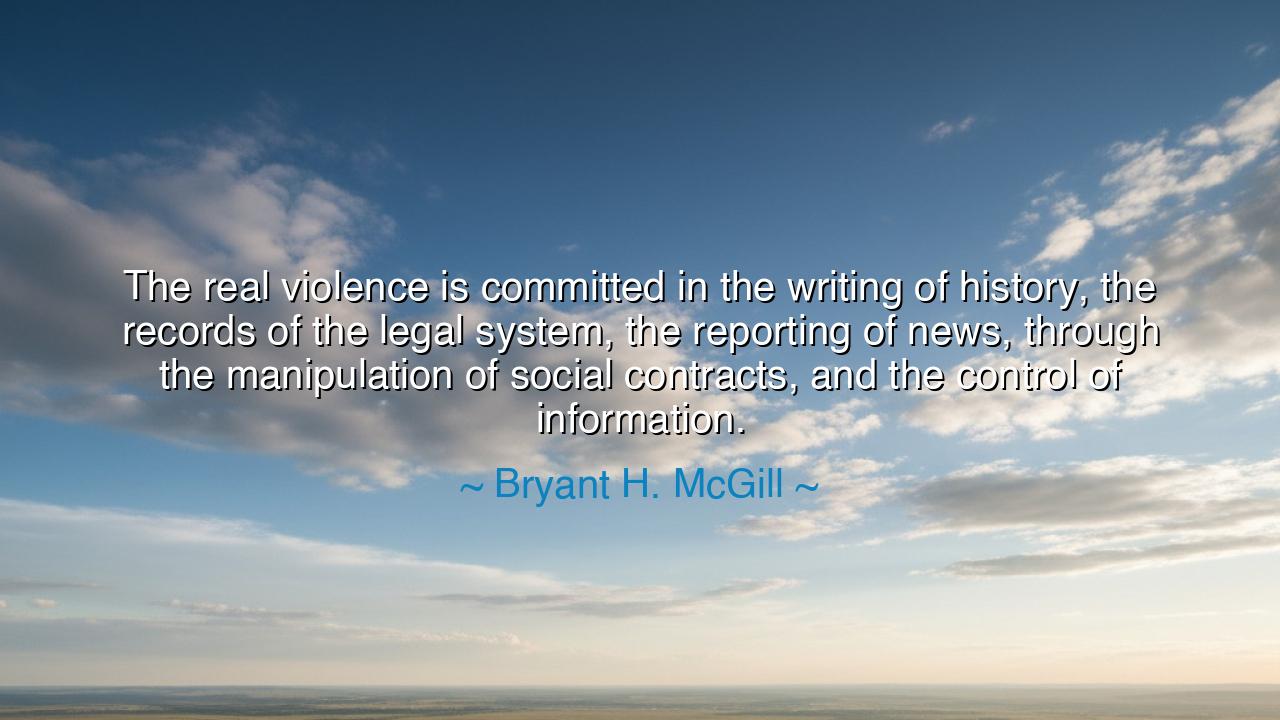
The real violence is committed in the writing of history, the
The real violence is committed in the writing of history, the records of the legal system, the reporting of news, through the manipulation of social contracts, and the control of information.






When Bryant H. McGill declared, “The real violence is committed in the writing of history, the records of the legal system, the reporting of news, through the manipulation of social contracts, and the control of information,” he was not speaking of blood spilled upon the battlefield, but of the quiet, invisible wars that shape the minds and destinies of nations. His words strike with the gravity of truth, for he reveals a subtler and more insidious form of violence — that which wounds the soul rather than the body, that which enslaves not through chains, but through narratives, laws, and illusions. McGill, a philosopher of the modern age, unmasks the truth that power, in its most refined form, does not roar — it whispers through institutions, records, and stories.
The origin of this quote lies in McGill’s reflections on social systems and moral structures — how the seeming order of civilization often conceals the mechanisms of control. Throughout history, he observed, those who hold authority have not only wielded weapons, but have also wielded the pen, the press, and the law as instruments of domination. The true battle for freedom, he suggests, is not fought upon open fields but within the realm of truth itself. To write history is to define reality; to control information is to sculpt belief; to manipulate the social contract is to command the soul of a people. Thus, the violence of censorship, propaganda, and false justice is not less cruel for being unseen — it is, perhaps, the cruelest of all.
Consider the writing of history, that most sacred of human endeavors — and yet, so often, the battlefield of deceit. Empires have long understood that if one can control the story of the past, one can command the loyalties of the present. The victors write their triumphs as moral destiny, while the vanquished are cast into silence. The truth becomes a servant of power. So it was when colonial powers rewrote the histories of the lands they conquered — teaching generations of native peoples to forget their heroes, their gods, their languages, until they began to doubt their own worth. This, McGill would say, is violence, greater than the whip or the sword — for it breaks the spirit, making slaves of free men through the erasure of memory.
In the legal system, too, McGill saw the hidden cruelty of human civilization. The law, in its ideal form, is meant to uphold justice; yet, too often, it becomes a shield for the powerful and a blade for the poor. Courts that favor the wealthy, verdicts swayed by politics, and prisons filled with the powerless — these are the silent massacres of morality. One needs only recall the centuries of institutionalized injustice — the segregation laws of America, the caste discriminations of India, the apartheid of South Africa — to see that oppression often wears the robes of legality. McGill’s words remind us that violence does not always scream; sometimes, it signs documents and stamps them with authority.
And what of the reporting of news — that sacred trust between truth and the public? When the press, meant to enlighten, becomes a weapon of manipulation, the mind of the people becomes the battlefield. The spread of propaganda, the suppression of facts, the distortion of words — these are the assassins of freedom. In the twentieth century, regimes both fascist and communist mastered this art: rewriting headlines, crafting illusions, teaching citizens not to question. But such deceit is not confined to tyrannies. Even in modern democracies, truth can be subtly bent, reality filtered, and voices silenced — not with the crack of a whip, but with the gentle turn of a phrase. As McGill warned, the control of information is the ultimate act of dominance, for when the mind is conquered, the body follows willingly.
A striking example of this hidden violence can be found in the story of Galileo Galilei, the great astronomer who dared to speak truth against the falsehoods of his age. When he proclaimed that the Earth revolved around the Sun, he did not face armies or assassins — he faced the might of doctrine and the weight of the Church’s authority. They forced him to recant, not with sword or chain, but with intellectual coercion, declaring falsehood as truth and truth as heresy. Here we see the power McGill describes: the ability to define reality through control of the narrative. Galileo’s imprisonment was not merely a punishment of a man — it was the silencing of an age. Yet even from his cell, truth whispered, and the stars themselves bore witness that no lie endures forever.
Thus, O seeker of understanding, let this wisdom be your guide: beware the unseen violence — that which hides behind words, laws, and books. Learn to question what is told to you, to read between the lines of history, to listen not only to the victors but to the silenced. Protect truth as a warrior protects his homeland, for truth is the lifeblood of freedom. To see clearly in a world of manipulation is itself a noble act of resistance.
And finally, remember this: though power may twist the record of men, truth is eternal. Lies fade like smoke before the wind, but truth — even if buried beneath centuries of deceit — will rise again, like dawn after the longest night. Let us, then, become keepers of light, writers of honest histories, and guardians of the free mind. For in doing so, we strike against the deepest violence of all — the violence against truth itself, and thereby defend the dignity of humankind.






AAdministratorAdministrator
Welcome, honored guests. Please leave a comment, we will respond soon